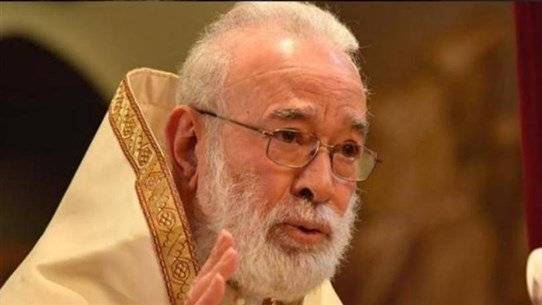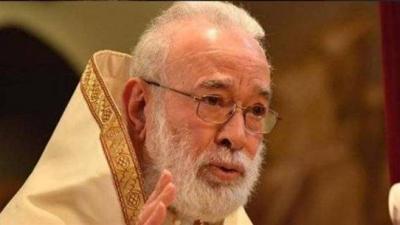Metropolitan Elias Audi of Beirut and its dependencies for the Greek Orthodox Church presided over the Divine Liturgy at St. George's Cathedral in Beirut.
After the Gospel, he delivered a sermon in which he said: "Today, our Antiochian Church commemorates a great Saint, a martyr among priests, named Joseph of Damascus, who must be recognized for the divine graces that characterized his life. He is Father Joseph Makhna al-Haddad, who hails from the village of Biskinta, where his father lived before moving to Damascus in the last quarter of the 18th century. There, his father worked in textile manufacturing and married, fathering three sons: Musa, Ibrahim, and Joseph. Musa was a literate man, well-versed in Arabic and sciences, acquiring a library containing many linguistic works, yet he died young in the early 19th century. His brother Ibrahim married and had children who spread between Egypt and Lebanon. As for Joseph, he was born in Damascus in May 1793. He learned the basics of Arabic and Greek, but due to his parents' poverty, he left school and turned to work in the textile and silk industry to support his family. Despite this, he did not abandon his reading, returning home from work at night to delve into the books of his brother Musa, which, when he found difficult to comprehend, led him to the study of language, rhetoric, debates, logic, and rational sciences. After realizing that educational expenses were high and burdensome, he devoted himself to reading, translating what he did not understand, becoming passionate about translation, and began comparing the Torah with the Psalms and their origins."
He added: "Thus, Joseph worked during the day and studied at night, copying books. His parents became worried about his condition, fearing that they might lose him as they lost his brother, so they prevented him from reading for the sake of his health, and then married him off to divert his thoughts from learning. Years later, the people witnessed Joseph's diligence and good conduct, and they asked their Patriarch to elevate him to the priesthood. The fame of Priest Joseph spread due to his dedication to serving his church and its congregation, his extensive guidance and teaching, and his prolific production, to the extent that he established a school where anyone wishing to ascend to the priesthood could study, alongside many linguistic, scientific, and religious sciences. The school consumed his attention, yet he realized he needed to appoint agents to manage its affairs under his oversight, so he could dedicate himself to preaching in the church and reforming people from the wrong habits that were prevalent at that time. His words deeply affected souls and he was able to achieve the desired change. Priest Joseph would travel to serve the members of his congregation outside of Damascus. He succeeded in dividing his time between his large family, numerous responsibilities, persistent reading and studying, preaching, discussions, Arabicization, authorship, teaching, copying, and caring for his parishioners while fulfilling his priestly duties. When the yellow plague broke out in Egypt in 1848, spreading to Damascus and devastating its residents, Priest Joseph demonstrated Christian zeal in serving the sick, burying the dead, and comforting the grieving. Thus, he spent his life in diligent work and struggle until the events of 1860 erupted and extended to Damascus. He continued to encourage and strengthen his fellow citizens until the last breath. When everyone fled, he gathered the remaining ones in the Maryamiyah Cathedral, where he went carrying the sacred relics and spent the night with them, encouraging them with his speeches. On the morning of June 28, an attack occurred on the Maryamiyah, and those inside were killed; however, Priest Joseph managed to escape with some citizens, but soon fell victim, and his body was shattered after he took the sacred relics he had with him to protect them."
He continued: "Saintliness is not mere words or grand speeches that might quote the Lord's words or might not. Saintliness is actions that translate the words of the Holy Scriptures and the Lord's commandments through humble and contrite service to His earthly flock, without boasting or fanfare. Here, we understand what the centurion said to the Lord Jesus in today's Gospel: 'Lord, I am not worthy to have you enter under my roof, but only say the word, and my servant will be healed. For I am a man under authority, with soldiers under me; I say to one, “Go,” and he goes, and to another, “Come,” and he comes, and to my servant, “Do this,” and he does it.' The centurion felt proud as he possessed earthly authority that allowed him to command those under him; thus, he did not see himself worthy of the Lord Jesus entering his house, as he found in Him authority not of this world; nonetheless, He never delayed in addressing people's needs. Therefore, Jesus' answer was immediate: 'I will come and heal him.' This divine love made the centurion reflect deeply and see that he was unworthy because he himself, placed in his role as a servant to the people, did not fulfill his duty, but rather, all he did was give orders to this one and that one."
He further remarked: "The faith, humility, and acknowledgement of his sin by the centurion serve as a lesson for anyone in position and power, so they may learn to return to themselves and to the Lord, finding that they do not deserve what has been assigned to them, for the true leader does not harbor resentment or injustice, nor is he arrogant or mistreats anyone, but humbles himself to convey salvation through him, just as occurred in the healing of the centurion's servant."
He said: "After what we have heard about the crime against childhood, we can only demand that the competent judiciary restore justice and hold the perpetrator accountable, punishing them as deserved, and not yield to any political or religious party that may intervene to exonerate the guilty and label the victims as criminals. The innocence of childhood should not be wounded or violated, a cause defended by the church, which holds accountable any aggressor affiliated with it. The defense of childhood does not stop at the issue of harassment or sexual assault but extends to the unacceptable matter of child marriage, domestic or emotional violence, bullying of children and teenagers, exploitation in labor, and other crimes against children and childhood. And while we may forget, we cannot overlook the heinous crime of the port that claimed the lives of hundreds of innocent victims, and its perpetrators are criminals, some of whom may hold positions in the state and its institutions, attempting to hinder or prevent investigations from revealing the truth to avoid exposing their crime." He concluded: "The return of the judiciary to its honest, just, and independent work, free from conflict and influence, restores balance to society and protects it from predatory wolves, regardless of who they may be. Finally, Saint Joseph of Damascus, along with today's Gospel, calls us to embody faith and courage accompanied by diligent work, humility, and love. Through this, humanity and nations find salvation. Amen."




